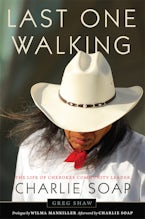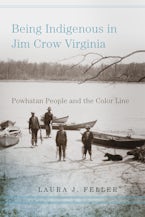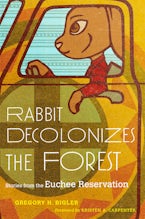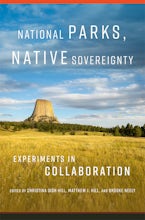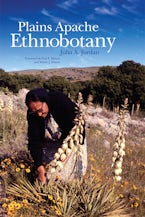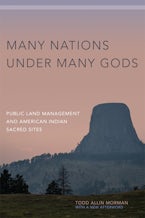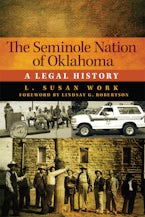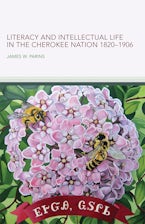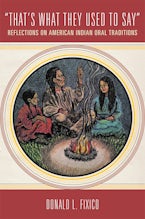SOCIAL SCIENCE / Ethnic Studies / Native American Studies
Showing results 1-10 of 536
Filter Results OPEN +

Last One Walking
The Life of Cherokee Community Leader Charlie Soap
The Native American fight for land has been well-chronicled, but the fight for water has not. Last One Walking helps to fill that void with a narrative that is also deeply moving, revealing on every page the spirit of ga-du-gi.
Being Indigenous in Jim Crow Virginia
Powhatan People and the Color Line
Spanning a century of fraught history, Being Indigenous in Jim Crow Virginia describes the critical strategic work that tidewater Virginia Indians, descendants of the seventeenth-century Algonquian Powhatan chiefdom, undertook to sustain their Native identity in the face of deep racial hostility from segregationist officials, politicians, and institutions.
Rabbit Decolonizes the Forest
Stories from the Euchee Reservation
The Euchee people are unknown to most Americans. They inhabit a small area of northeastern Oklahoma and have yet to receive federal recognition. Yet even in their modern-day lives—as these stories capture so beautifully—the Euchee people remain fiercely determined to show “they are still here.”
National Parks, Native Sovereignty
Experiments in Collaboration
National Parks, Native Sovereignty emphasizes emotional commitment, mutual respect, and patience, rather than focusing on “land-back” solutions, in the co-creation of a socially sensible public lands policy.
Plains Apache Ethnobotany
Residents of the Great Plains since the early 1500s, the Apache people were well acquainted with the native flora of the region. In Plains Apache Ethnobotany, Julia A. Jordan documents more than 110 plant species valued by the Plains Apache and preserves a wealth of detail concerning traditional Apache collection, preparation, and use of these plant species for food, medicine, ritual, and material culture.
Many Nations under Many Gods
Public Land Management and American Indian Sacred Sites
A much-needed intervention, Many Nations under Many Gods brings to light the invisible histories of several Indian nations, as well as their struggles to protect the integrity of sacred and cultural sites located on federal public lands.
The Seminole Nation of Oklahoma
A Legal History
When it adopted a new constitution in 1969, the Seminole Nation was the first of the Five Tribes in Oklahoma to formally reorganize its government. In the face of an American legal system that sought either to destroy its nationhood or to impede its self-government, the Seminole Nation tenaciously retained its internal autonomy, cultural vitality, and economic subsistence. Here, L. Susan Work draws on her experience as a tribal attorney to present the first legal history of the twentieth-century Seminole Nation.
Literacy and Intellectual Life in the Cherokee Nation, 1820–1906
Many Anglo-Americans in the nineteenth century regarded Indian tribes as little more than illiterate bands of savages in need of “civilizing.” In Literacy and Intellectual Life in the Cherokee Nation, 1820–1906, James W. Parins traces the rise of bilingual literacy and intellectual life in the Cherokee Nation during the nineteenth century—a time of intense social and political turmoil for the tribe.
The Little Water Medicine Society of the Senecas
In The Little Water Medicine Society of the Senecas, he presents his original 1933 fieldwork, along with details from the published and unpublished works of other researchers, to describe rituals, poetry, and songs drawn from his more than six decades of research among the Six Nations.
"That's What They Used to Say"
Reflections on American Indian Oral Traditions
Sharing these stories, and the larger story of where they come from and how they work, “That’s What They Used to Say” offers readers rare insight into the oral traditions at the very heart of Native cultures, in all of their rich and infinitely complex permutations.

Last One Walking
The Life of Cherokee Community Leader Charlie Soap
The Native American fight for land has been well-chronicled, but the fight for water has not. Last One Walking helps to fill that void with a narrative that is also deeply moving, revealing on every page the spirit of ga-du-gi.
Being Indigenous in Jim Crow Virginia
Powhatan People and the Color Line
Spanning a century of fraught history, Being Indigenous in Jim Crow Virginia describes the critical strategic work that tidewater Virginia Indians, descendants of the seventeenth-century Algonquian Powhatan chiefdom, undertook to sustain their Native identity in the face of deep racial hostility from segregationist officials, politicians, and institutions.
Rabbit Decolonizes the Forest
Stories from the Euchee Reservation
The Euchee people are unknown to most Americans. They inhabit a small area of northeastern Oklahoma and have yet to receive federal recognition. Yet even in their modern-day lives—as these stories capture so beautifully—the Euchee people remain fiercely determined to show “they are still here.”
National Parks, Native Sovereignty
Experiments in Collaboration
National Parks, Native Sovereignty emphasizes emotional commitment, mutual respect, and patience, rather than focusing on “land-back” solutions, in the co-creation of a socially sensible public lands policy.
Plains Apache Ethnobotany
Residents of the Great Plains since the early 1500s, the Apache people were well acquainted with the native flora of the region. In Plains Apache Ethnobotany, Julia A. Jordan documents more than 110 plant species valued by the Plains Apache and preserves a wealth of detail concerning traditional Apache collection, preparation, and use of these plant species for food, medicine, ritual, and material culture.
Many Nations under Many Gods
Public Land Management and American Indian Sacred Sites
A much-needed intervention, Many Nations under Many Gods brings to light the invisible histories of several Indian nations, as well as their struggles to protect the integrity of sacred and cultural sites located on federal public lands.
The Seminole Nation of Oklahoma
A Legal History
When it adopted a new constitution in 1969, the Seminole Nation was the first of the Five Tribes in Oklahoma to formally reorganize its government. In the face of an American legal system that sought either to destroy its nationhood or to impede its self-government, the Seminole Nation tenaciously retained its internal autonomy, cultural vitality, and economic subsistence. Here, L. Susan Work draws on her experience as a tribal attorney to present the first legal history of the twentieth-century Seminole Nation.
Literacy and Intellectual Life in the Cherokee Nation, 1820–1906
Many Anglo-Americans in the nineteenth century regarded Indian tribes as little more than illiterate bands of savages in need of “civilizing.” In Literacy and Intellectual Life in the Cherokee Nation, 1820–1906, James W. Parins traces the rise of bilingual literacy and intellectual life in the Cherokee Nation during the nineteenth century—a time of intense social and political turmoil for the tribe.
The Little Water Medicine Society of the Senecas
In The Little Water Medicine Society of the Senecas, he presents his original 1933 fieldwork, along with details from the published and unpublished works of other researchers, to describe rituals, poetry, and songs drawn from his more than six decades of research among the Six Nations.
"That's What They Used to Say"
Reflections on American Indian Oral Traditions
Sharing these stories, and the larger story of where they come from and how they work, “That’s What They Used to Say” offers readers rare insight into the oral traditions at the very heart of Native cultures, in all of their rich and infinitely complex permutations.

